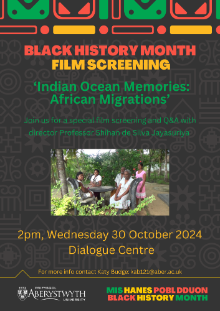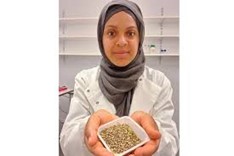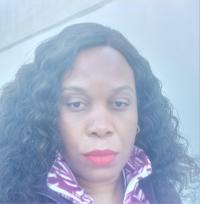Black History Month 2024
This Black History Month at Aberystwyth we are celebrating Black Thinkers, Writers, Scientists and Creatives who have inspired our work across the university. We will feature members of our Aberystwyth community and shine a light on their work, while finding out which black people have inspired them.
Keep an eye out for posters appearing across campus featuring a broad range of influential Black scholars, from anti-colonial radical, Frantz Fanon to NASA scientist and mathematician, Katherine Johnson. (Hint... Some will be on display when you visit the Art Centre or at the entrance of the Visualisation Centre).
Black History Month events
-
- ‘From "A Tolerant Nation?" to an "Anti-Racist Nation?" The Politics of Race Equality in Wales’.
Friday 18 October, 530pm - National Library of Wales and online
Welsh Political Archive’s Annual Lecture for 2024 - This year’s speaker is Prof. Charlotte Williams OBE FLSW. She will offer a view of the past, present and future commitment of the Welsh Government in respect of race equality, with it being 25 years since the devolutionary settlement in which race equality was set as a constitutional aspiration.
Tickets are free and can be ordered here: https://www.ticketsource.co.uk/llgcnlw/t-eaykyje - “Thomas Phillips: Enslaver, Colonist, Bibliophile”
Tuesday 22 October, 630pm - Drwm, National Library of Wales
With Alex Scott, International Slavery Museum
Register your interest by emailing Gareth Hoskins tgh@aber.ac.uk - Reclaiming Narratives: With and Beyond Black History Month On a University Campus
Wednesday 23 October 2-3pm, Ty Trafod/ Dialogue Centre
Workshop hosted by Liz Gagen and Gareth Hoskins
Register here.
- ‘From "A Tolerant Nation?" to an "Anti-Racist Nation?" The Politics of Race Equality in Wales’.
 Film screening: 'Indian Ocean Memories: African Migration'
Film screening: 'Indian Ocean Memories: African Migration'
Wednesday 30 October 2pm start, Ty Trafod/ Dialogue Centre
Join us for a special screening of the film 'Indian Ocean Memories: Africa Migrations' (2014, 40 min) and Q&A with the director Professor Shihan de Silva Jayasuriya.
To register your place email Katy Budge kab121@aber.ac.uk
Celebrating Black Thinkers, Writers, Scientists and Creatives here at Aberystwyth
Dr Jamila La Malfa-Donaldson
 Can you tell us a bit about yourself?
Can you tell us a bit about yourself?
My name is Dr Jamila La Malfa-Donaldson. I was born and grew up in South-East London. My father is Jamaican, and my mother is Italian. At 18, I moved to Birmingham to study Chemical Engineering, with ambitions to develop practical skills to solve real-world problems. After graduating, I continued to work as a Science Communicator, running STEM workshops in schools across the UK and abroad. My young family and I then moved to pursue my PhD at Aberystwyth University. My research project involved investigating analytical testing, cultivation, and processing methods for industrial hemp. Keen to share the amazing health and environmental benefits of hemp, I entered the university's InvEnterPrize competition and used the funding to start my business. PROHEMPOTIC is my agri-food tech startup dedicated to using innovate processing methods to enhance the properties of hempseed to make nutritious and sustainable food and drink products/ingredients. Whilst growing my business, I also work for the UK Agri-Tech Centre, providing technical support to innovative R&D projects.
Which Black Thinker (etc) has particularly inspired or influenced your work?
I have been deeply influenced by many Black intellectuals, particularly two George Carver Washington and Wangarĩ Maathai.
Can you tell us a bit about them?
George Carver Washington, best known as the inventor of peanut butter, has inspired my academic and professional ambitions. He was a true innovator who not only developed hundreds of different products from the peanut but also promoted the use of alternative crops to enrich the soil and provide economic opportunities for marginalised farmers. He commitment to teaching and mentorship of his students at Tuskegee Institute is admirable. I've been also moved to learn more about his spiritual connection to God, despite the criticism he received from the media and scientific community. Wangarĩ Maathai is a Kenyan activist, environmentalist, and first the Black African women to win a Nobel Peace Prize. I have been most inspired by her Green Belt Movement, which empowered local women to do for self and plant over 51 million trees in Kenya to provide an accessible source of fuel whilst protecting the environment. Her commitment to women's rights and addressing poverty and access to healthcare is a shining example of a holistic approach to sustainable development on the continent.
Where can students find out more about them (e.g. books, module, your research etc)?
To get a better understanding of George Carver Washington's life and character, I recommend reading George Washington Carver: His Life & Faith in His Own Words by William J. Federer. You can find out more about the philosophy and legacy of Wangarĩ Maathai from Replenishing the Earth: Spiritual Values for Healing Ourselves and the World by Wangari Maathai. I have also enjoyed reading Mama Miti: Wangari Maathai and the Trees of Kenya by Donna Jo Napoli and Kadir Nelson with my children.
Dr Onyinyechukwu Durueke

My name is Dr Onyinyechukwu Durueke, and I am a Peace and Conflict Scholar specialising in Gender, Peace and Security; and Post-Conflict Reconstruction. My current research explores the gendered effects of Counterinsurgency (COIN) campaigns on civilian populations, with a specific focus on the strategies men and boys employ to escape gender-based violence (GBV) related to COIN. While GBV has become a central concern in the human security community, it is typically framed as violence against women and girls, who are often seen as the primary victims. Due to societal constructions of masculinity, much less attention has been given to the equally gendered experiences of men and adolescent boys during (post-)conflict periods. My research contributes to emerging scholarship that expands the study of GBV to include the often-overlooked experiences of men and boys.
Can you tell us a bit about a Black Thinker who has inspired and influenced your work?
There are several Black Thinkers who have influenced my work but one of them stands out, bell hooks. bell hooks (born Gloria Jean Watkins) was an influential Black feminist scholar, cultural critic and author. Her work centred on the intersections of race, gender, class and capitalism. She examined how these systems of power create oppression and inequality. As a thinker and philosopher, hooks was known for her accessible and deeply personal writing style, which often blended academic theory with personal experiences, making complex ideas relatable to a broader audience.
One of her most significant contributions was her critique of the ways white supremacy and patriarchy marginalise Black women, which she termed "imperialist white-supremacist capitalist patriarchy." She highlighted how mainstream feminism often neglected the experiences of women of colour, particularly Black women, and called for a more inclusive and intersectional approach to feminist theory and activism.
bell hooks' emphasis on intersectionality—the recognition that race, class and gender intersect to shape experiences of oppression—has significantly influenced my approach to the Women, Peace and Security (WPS) Agenda. hooks' critique of universalising feminist frameworks resonates with my concerns about treating the United Nations Security Council Resolution on WPS as a universal norm. Just as hooks argued that the experiences of Black women in the United States of America cannot be reduced to those of white women, I argue that women's experiences in conflict zones differ widely across global contexts. The realities faced by women in the Global South are shaped by local histories, economies and political structures, distinct from those in the Global North. Inspired by hooks' work, I advocate for more context-specific approaches to WPS that recognise the diversity of women's experiences and the unique challenges they face.
Where can we learn more about this Thinker?
Some of her most famous works include Ain’t I a Woman? Black Women and Feminism (1981); Feminist Theory: From Margin to Centre (1984) and All About Love: New Visions (1999). These books shed further light on the profound impact of bell hooks.
